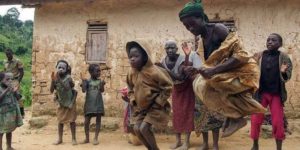Batwa People in Bwindi – Gorilla Trekking & Batwa Tour
The Batwa people also are known as the “Twa” or “Abatwa” or Ge-Sera” and were known as the “Keepers of the Forest”. The term “twa” is used in the Bantu languages of sub-Saharan Africa to refer to humans who are original inhabitants of the area and hunter-gatherers.
They are “pygmy”/’small-statured” people as referred by the nonpygmy tribes, originally had their home in Bwindi forest and were acknowledged to be the owners of the mountainous forest. They used to hunt animals, collect mushrooms, fruits, collect honey, herbal medicines and other forest products and their entire livelihood depended on it. It is estimated that they lived in the forest for more than 50,000 years.

They are known as Uganda’s first people known as hunters and gatherers. They were first colonized by agriculturalists, then pastoralists and finally by the Europeans is hence known as the “forgotten people”. The Batwa were fierce warriors who used to live in Bwindi National park and depended on the forest for shelter, food, and medicine before it was gazetted. The history of the Batwa lies in a man called Kihanga who had three sons called Katwa, Kahutu and Katutsi. He gave a gourd of milk to each of his sons one day and the next morning he asked all the sons for the gourd of milk. Katutsi still had the full gourd of milk and his father gave him all his cows because he was able to keep the milk, Kahutu had half-full gourd of milk and his father gave him a hoe and seeds whereas Katwa had an empty gourd and his father gave him the forest. His generation depended on hunting and gathering forest products. Many generations passed with more and more descendants whereby the agriculturalists and pastoralists could not sustain themselves. They started encroaching the forest thereby displacing the Katwa’s descendants who became homeless and beggars.
Currently, they are found in the mountainous districts of Kisoro, Kabale, and Rukungiri and their estimated population is between 80,000 and 112,000. They are a minority group in Uganda, Rwanda, Burundi and the Eastern Democratic Republic of Congo
When Bwindi became a national park and declared a world heritage site by UNESCO in 1991 with an aim of conserving the endangered species of Mountain gorillas from getting extinct, these inhabitants of the forest were displaced without compensation.
They have become an important tourist attraction in Uganda because of their lifestyle and activities among the Batwa people include community walks of the cultural trails, traditional dances, visiting traditional herbalists. Batwa are distinguished into three (3) lifestyle practices of foresters, potters, and fisherfolks. There are opportunities for learning more about the lifestyle of each group. Tourists also enjoy watching how they gather honey, also visit the sacred Ngarama cave which is 200 meters long was once a home of the Batwa king. Here women perform sorrowful songs mourning their lost original way of living.
The Batwa still practice cultural rites, still believe in the gods and spirits of their ancestors and don’t follow religious practices. The majority of them still use traditional herbal medicines though these days they are continuously accessing health facilities because the Batwa still are marginalized, they still face discrimination. They are the only marginalized group that is not presented in government and still battle for equal treatment in public places.
Conclusively, the Batwa experience is one of the important attractions around Bwindi where tourists can get to learn about their cultural practices, religious practices and their general way of life among this unique group of people who are believed to be the first Homo sapiens in Uganda.
